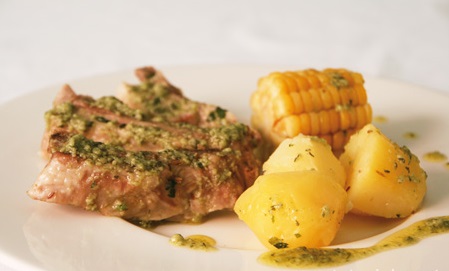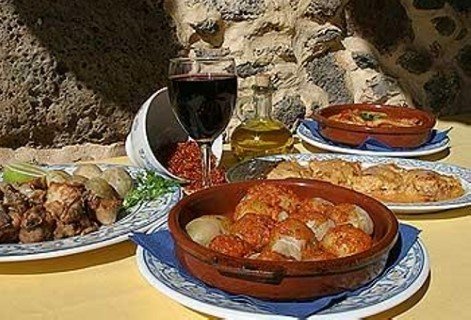Cochino con millo
Pork Roast with Corn
This recipe originated on the island of Lanzarote. It calls for millo, Canarian for "corn", evidence of the early influence of New World foods on this way station for the Conquistadores. It also uses basil, which is unusual for Canarian cooking, despite the fact that it grows wild alongside the roads. Spareribs are delicious prepared this way, too; they need to cook for only about the time.
- Serves 8
Ingredients
- 1 (2 1/2 pound) bone-in pork loin or pork shoulder roast
- Salt
- Freshly ground black pepper
- 5 tablespoons olive oil
- 2 yellow onions, chopped
- 1 1/2 cups water
- 4 ears corn
- 1 cup dry white wine
- 3 carrots, peeled and sliced
- 1/2 teaspoon black peppercorns
- 3 basil sprigs
- Pinch of freshly grated nutmeg
Preparation
Preheat the oven to 400F. Season the pork with salt and pepper and brush with 2 tablespoons of the olive oil. In a skillet over high heat, brown the pork on all sides. Transfer the pork to a roasting pan large enough to accommodate the addition of the vegetables later. Roast for 45 minutes.
Meanwhile, in a skillet, heat the remaining olive oil over medium heat. Add the onions and sauté for about 10 minutes, or until lightly browned. Set aside.
In a wide saucepan, bring the water to a boil over high heat. Add the corn and boil for 10 minutes. Drain, reserving the cooking liquid. When the corn is cool enough to handle, cut crosswise in to 2-inch-thick rounds. Set aside.
After the pork has been roasting for 45 minutes, pour the wine and the reserved corn cooking liquid over it. Add the sautéed onions, corn, carrots, peppercorns, and basil to the pan and season them lightly with nutmeg. Roast for 45 minutes longer, or until the pork and vegetables are tender.
Remove from the oven. Slice the roast and arrange on a serving platter with the vegetables. Serve hot.
You may be also interested in...
See also
Poultry, meat, and game recipes: Spanish cooks readily draw on a broad palette on poultry, meats and game for the everyday table, just as their ancestors have for centuries
Canary Islands: The Spanish often refer to the Canary Islands as the "Islas Afortunadas" as the shine shines practically throughout the year, their only borders are the sky and the sea, and because their fauna, flora and culture, at time so different to that of mainland Spain, are real treasures. However, perhaps it would be more appropriate to call the visitor to these islands "fortunate"; not only because he can enjoy the sun, sea and environment but also because he has been presented with the opportunity to taste their culinary delights.





